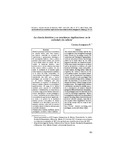| dc.rights.license | http://creativecommons.org/licenses/by-nc-sa/3.0/ve/ | |
| dc.contributor.author | Aranguren R., Carmen | |
| dc.date.accessioned | 2009-02-09T15:55:53Z | |
| dc.date.available | 2009-02-09T15:55:53Z | |
| dc.date.issued | 2009-02-09T15:55:53Z | |
| dc.identifier.uri | http://www.saber.ula.ve/handle/123456789/26747 | |
| dc.description.abstract | El interés actual por la historia y su enseñanza ha cobrado fuerza, entre otras razones, por haberse convertido en escenario
de controversias y apropiaciones ideológicas. El conocimiento histórico, crítico y plural, permite aclarar dónde estamos, qué ocurrió y hacia dónde hemos de avanzar. En este sentido, la formación histórica como práctica ética y social, evidencia una trama entre saberes, valores y política. De este modo, la enseñanza de la historia regula indirectamente el comportamiento ciudadano en la esfera del orden sociopolítico. La ciencia histórica descriptiva y su enseñanza reproductiva han dado paso a nuevos paradigmas que encauzan el conocimiento y sus enlaces axiológicos por rutas innovadoras en respuesta a la demanda de intensos cambios culturales en sus múltiples manifestaciones. El campo de la historia enseñada posee
espacios de sociabilidad plurales y contradictorios; en consecuencia, su análisis exige penetrar distintos itinerarios
teóricos, disciplinares, sociales pedagógicos y cívicos, transitados por los sujetos actores en un ámbito de negociación de
significados. La teoría y la práctica de la enseñanza histórica poseen el fi n político de formar ciudadanos en la diversidad y preservar la memoria colectiva, sobre todo en nuestras sociedades donde el olvido ha sido una razón de pérdida identitaria. | es_VE |
| dc.language.iso | es | es_VE |
| dc.rights | info:eu-repo/semantics/openAccess | |
| dc.subject | Historia | es_VE |
| dc.subject | Enseñanza | es_VE |
| dc.subject | Nuevos paradigmas | es_VE |
| dc.subject | Sociedad y cultura ciudadana | es_VE |
| dc.title | La ciencia histórica y su enseñanza. Implicaciones en la sociedad y la cultura | es_VE |
| dc.title.alternative | The historical science and the teaching: implications in the society and the culture | es_VE |
| dc.type | info:eu-repo/semantics/article | |
| dc.description.abstract1 | The current interest in history and the way it is taught has been strengthened amongst other reasons by becoming scenery for
controversy and "ideological" appropriation. Critical and plural history knowledge allows us to clarify where we are, what happened and where we should be headed. In this sense, history education as an ethical and social practice is evidence of a plot between knowledge, values and politics. In this manner, teaching history indirectly regulates the citizen’s behavior in the socio-political sphere. Descriptive historic science and its reproductive teaching has opened the path to new paradigms that educate about knowledge and its axiological links via innovation, as an answer to the demand for intense cultural
changes in their multiple forms. The taught history fi eld has contradictory and plural sociability spaces. As a consequence, its analysis demands going into different theoretical, disciplinary, social, pedagogical and civic itineraries by all actors in a meaning’s negotiation. History teaching theory and practice has the political goal of educating citizens about diversity and preserve collective memory, especially in our societies where forgetfulness has been one of the reasons
why we seem to lose our identity. | es_VE |
| dc.description.colacion | 101-110 | es_VE |
| dc.description.email | aran@ula.ve, carmenaran@hotmail.com | es_VE |
| dc.publisher.pais | Venezuela | es_VE |
| dc.subject.facultad | Facultad de Humanidades y Educación | es_VE |
| dc.subject.keywords | History | es_VE |
| dc.subject.keywords | Teaching | es_VE |
| dc.subject.keywords | New paradigms | es_VE |
| dc.subject.keywords | Society and citizen culture | es_VE |
| dc.subject.publicacionelectronica | Revista Presente y Pasado | es_VE |
| dc.subject.seccion | Revista Presente y Pasado: Artículos | es_VE |
| dc.subject.thematiccategory | Artes y Humanidades | es_VE |
| dc.subject.tipo | Revistas | es_VE |
| dc.type.media | Texto | es_VE |



